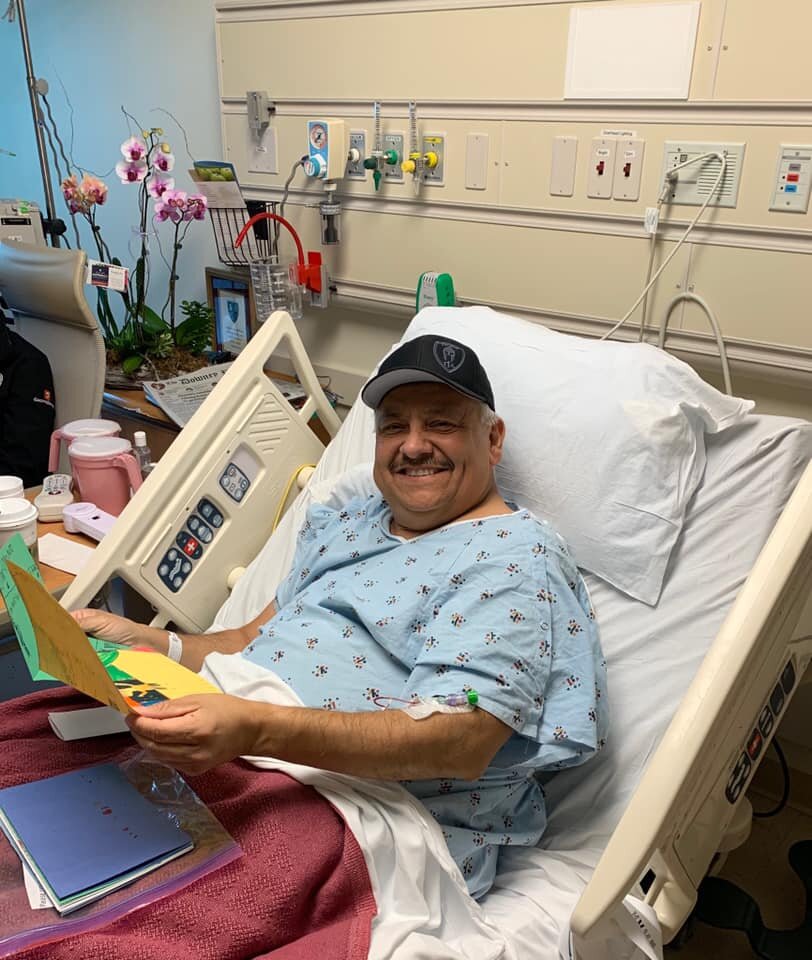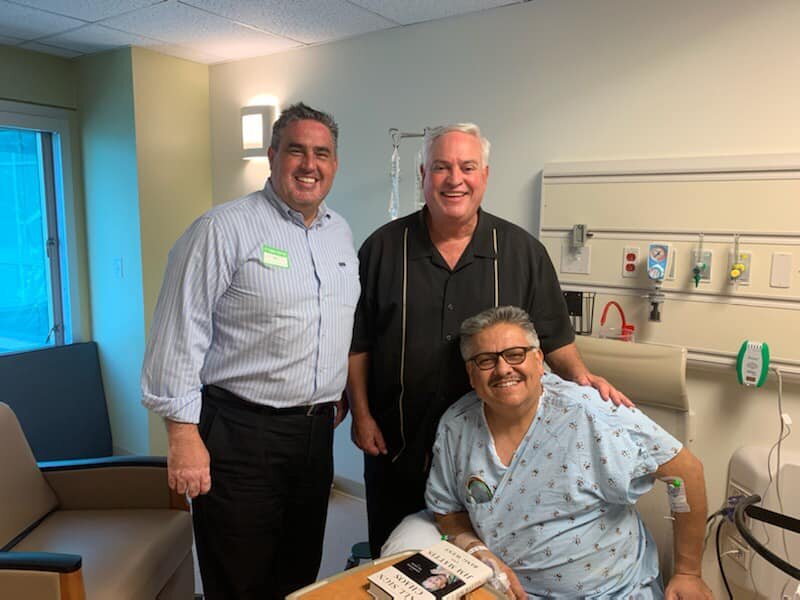Rick Rodriguez shares details of cancer scare
DOWNEY – Downey Mayor Rick Rodriguez sat straight up in his backyard patio chair and reflected.
His face was noticeably thinner, the result of a 30-lb. weight loss in barely a month. His arms and shoulders –skinny also – disappeared underneath a black t-shirt emblazoned with his favorite slogan, “Always Forward.”
It was a rough summer for the Downey mayor, who endured multiple health scares that resulted in him being pricked, prodded and probed over the course of several hospitalizations and one surgery.
But Rodriguez’s health scares were more than just uncomfortable — they were legitimately life-threatening.
Mayor Rick Rodriguez with his dog, Desi, on Oct. 21. Photo by Eric Pierce
“I planned my own funeral,” admitted Rodriguez, who is 59. “I called [Risher Mortuary owner] Greg Welch and he gave me a workbook. I told my oldest son, ‘The workbook’s in my top desk drawer. If something happens, don’t burden Mom or your brothers and sisters. You take charge of this. Everything’s done, everything’s paid for. Just go forthright.’”
Rodriguez has chosen to go public with his health battles for two reasons: to encourage other people, particularly men, not to ignore warning signs that something is wrong with their health; and to publicly thank the doctors and staff of Kaiser Permanente Downey Medical Center, who he credits with saving his life.
For Rodriguez, the first sign that something was wrong emerged earlier this year.
“I was going to the restroom four to five times an hour, sometimes 10 times an hour,” Rodriguez said. “I brushed it off. I felt like, ‘I’m getting older. I guess this is reality.’
“Six months go by and then one morning, I got up and I noticed I urinated blood. I took a shower and it happened again. That was an eye-opening experience.”
Rodriguez visited a urologist and then an oncologist. Each visit came with biopsies, MRIs, scopes and cameras. Doctors discovered Rodriguez had elevated prostate-specific antigen (PSA) levels, which is oftentimes an early indicator of prostate cancer.
“It’s not until they say, ‘Hey look, I think you have a 60-65 percent chance of having cancer, we have to get in there,’ that you take it serious,” he said.
“At first when they say that to you, you say, ‘Holy smokes, I’m going to die.’ When there’s a crack in the armor, you think, ‘Holy smokes, what happens now? What happens to my family?
“But then you say, ‘Time out. In order for me to die, I have to quit. I have to give up.’”
As this was playing out in private, Rodriguez continued to fulfill his obligations as mayor.
“I didn’t want the city to know I had any issue with cancer, so I just put a smile on my face and said, ‘Let’s go.’ I attended every meeting regardless of whether I had a biopsy two days prior. Being mayor was actually the best therapy for me.”
Surgery was scheduled for Sept. 6, where surgeons removed 100 grams from Rodriguez’s prostate, along with samples of his kidney and bladder. The surgery was a success – no cancer – but came at a cost: severe internal bleeding.
“I never expected the pain in the abdomen that I had,” said Rodriguez, who had back surgery in 2012. “The comparison would be to doing a thousand push-ups a day for 30 days. I couldn’t sit up straight, I was consistently in the fetal position, I couldn’t walk very well.
“And then lo and behold, what happens next, I herniated a disc. The disc slides out of my spine like a melted candle, and I couldn’t move.”
The Downey Fire Department transported Rodriguez back to Kaiser, where he was injected with morphine and spent four days in the hospital. Doctors wanted to operate on the mayor’s back, but he declined, opting for physical therapy.
Mayor Rick Rodriguez reads get-well cards from local fifth graders.
On Oct. 6, exactly one month after his prostate surgery, Rodriguez found himself at home debilitated from back pain and again urinating blood.
“I didn’t want my wife (Lupe) to know what was going on,” Rodriguez said. “But my Apple watch told me my heart was going into AFIB.”
Firefighters again took Rodriguez to Kaiser’s emergency room, where technicians performed an emergency ultrasound on his bladder.
“They came to find out my bladder was covered with blood clots, preventing me from making my own blood,” he said. “They had to go into my body, get rid of those blood clots, get them all out of me – by this time I lost two pints of blood and was approaching cardiac arrest.”
Over the next 24 hours, Rodriguez underwent two blood transfusions. A nurse called Rodriguez’s survival “a miracle.” He would spend an additional seven days hospitalized.
Today, Rodriguez is back home and on the mend but under strict orders to rest. He has more doctors’ appointments this week and begins physical therapy this month. His goal is to recover well enough to return to City Hall in November and finish out his term as mayor.
“As timing would have it, we have two grand openings planned for our city parks next month, which gives me an opportunity to start on my health goals,” Rodriguez said.
In his time away, Rodriguez has stayed on top of local news and regularly watches video of City Council meetings, which Mayor Pro Tem Blanca Pacheco has led in Rodriguez’s absence. He’s aware of the criticism leveled by a small group of protesters who questioned Rodriguez’s commitment to the city.
“The first reaction is kind of hurt,” Rodriguez said. “I was in the hospital when I first read that. I had tubes everywhere…
“I read that thing in my hospital bed, and it really broke my heart. I said, ‘Man, is that what the residents really think of me?’ If that’s the case, then I’m OK with stepping down. Let somebody better than me have this job. Somebody smarter, younger, healthier, let them have this job.
“And then I started to receive emails and text messages and letters and cards, flowers, baskets that were sent by people saying, ‘Don’t listen to the naysayers. We want you back. We need you back.’ And that caused me to dig my heels in and say, ‘I’m doing this. I’m getting back to my health, I’m getting back in my office.’
“That’s the long answer. At first, it was fear and hurt, and then it went to anger and persistence.”
Councilman Alex Saab and former mayor Mario Guerra visit Mayor Rick Rodriguez.
Rodriguez credits his ongoing recovery to his urologist, Dr. William Chu, the Downey Fire Department, and “the men and women of Kaiser Downey.”
“They not only cheerfully cared for me during my recovery, which included two separate occasions in the Kaiser ER, but the compassion that they demonstrated to all Kaiser patients was amazing to witness first hand,” Rodriguez said. “We are so fortunate to have these servants in our city. Words cannot express my gratitude for these special people that have answered the call to save the lives of others.
“Going through this has served as a reminder of just how important regular health check-ups are. Health truly is wealth. It’s easy to take your health for granted until you have something go wrong.”



